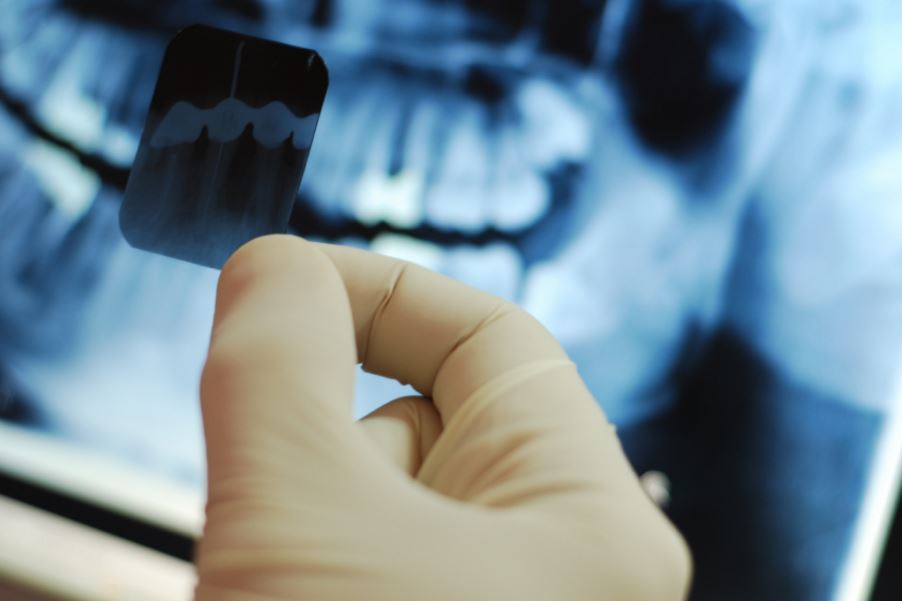
X-rays,
also known as radiographs, are an essential part of any dental care treatment plan. They are diagnostic, but they can also be preventive, by helping a
dentist diagnose potential oral care issues in a patient’s mouth before they
become a major problem. Intraoral X-rays are the most common type of radiograph
taken in dentistry. They give a high level of detail of the tooth, bone and
supporting tissues of the mouth. Dentists want to provide the best possible
dental care to their patients, but a visual examination doesn't tell them
everything they need to know. Thanks to dental X-rays, dentists can accurately
diagnose and treat dental problems early before they become more serious and if
after examining your mouth and reviewing these images, your dentist finds no
cavities or growth issues, you can rest assured he or she has seen the whole
picture.
What are dental X-rays?
A
full-mouth series of periapical X-rays (about 14 to 21 X-ray films) is most
often done during a person's first visit to the dentist. Bitewing X-rays are
used during checkups to look for tooth decay. Panoramic X-rays may be used
occasionally. Dental X-rays are scheduled when you need them based on your age,
risk for disease, and signs of disease. Dental X-rays are pictures of the
teeth, bones, and soft tissues around them to help find problems with the
teeth, mouth, and jaw. X-ray pictures can show cavities, hidden dental
structures (such as wisdom teeth), and bone loss that cannot be seen during a
visual examination. Dental X-rays may also be done as follow-up after dental
treatments.

How often do I need to get a dental
X-ray?
The
frequency of getting X-rays of your teeth often depends on your medical and
dental history and current condition. Some people may need X-rays as often as
every six months; others with no recent dental or gum disease and who visit
their dentist regularly may get X-rays only every couple of years. If you are a
new patient, your dentist may take X-rays as part of the initial exam and to
establish a baseline record from which to compare changes that may occur over
time. X-rays of molars only every two to
three years to check for early cavities.
More extensive X-rays may be needed every three to five years to check
the health of roots and adjacent bone. Children may need X-rays as often as
every year or two because their teeth are changing rapidly.
What can happen if I don’t receive
regular dental X-rays?
Dental
X-rays help dentists visualize diseases of the teeth and surrounding tissue
that cannot be seen with a simple oral exam. Dental x-rays are the road map
that the dentist uses to diagnose a variety of oral diseases. Without x-rays
conditions such as cavities, gum disease, fractured teeth, root canal
infections and even cancer may go undetected. Early detection of oral health
problems usually means less invasive and less costly treatment.
How much radiation am I exposed to
during a dental X-ray?
Many
observational studies have found that exposure to dental X-rays is associated
with the risk of development of meningioma. However, these findings are
inconsistent. Dental x-rays are one of the lowest radiation dose studies
performed. The amount of radiation received from dental radiography is so low
that it is highly unlikely that it results in a measurable risk. Dose
reconstructions using techniques commonly used during the last decades of the
last century show that the exposure to the brain from 4 bitewings is
approximately 0.07 mGy, and from a panoramic examination about 0.02 mGy. A
full-mouth examination (typically consisting of 12 periapical and 4 bitewing
exposures) results in a brain dose of approximately 0.24 mGy.
This is a truly good site post. Not too many people would actually, the way you just did. I am really impressed that there is so much information about this subject that have been uncovered and you’ve done your best, with so much class. If wanted to know more about green smoke reviews, than by all means come in and check our stuff. dental implants Northampton
ReplyDeleteThanks for sharing this detailed article on dental x-rays. I enjoyed all the details of information that you provided and explained perfectly. Have a wonderful day.
ReplyDeleteDentist Philadelphia
Thank you for sharing the blog. There is Dr. vivek pandiyan uses best quality techniques to serve the patients. We have dedicated and experienced staff in the clinic who keep the friendly environment of the clinic.
ReplyDeletecost of dental implants in india
AllOn4 in india
Dental implants in Chennai
Thanks for taking the time to share this excellent post with us.
ReplyDeleteRoot canal treatment in chennai
invisalign cost in chennai
Root canal cost in chennai